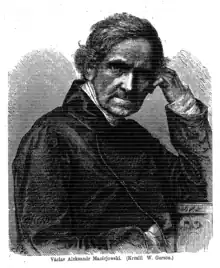Wacław Aleksander Maciejowski | |
|---|---|
 Wacław Maciejowski in 1870 | |
| Born | 10 September 1792 |
| Died | 10 February 1883 (aged 90) |
| Resting place | Warsaw |
| Nationality | Polish |
| Alma mater | University of Warsaw, Humboldt University of Berlin, University of Göttingen |
| Occupation | Historian |
Wacław Aleksander Maciejowski (10 September 1792[1] – 10 February 1883)[2] was a Polish historian.
Maciejowski was born in Cierlicko near Cieszyn.[1] He studied in Warsaw, Berlin, and Göttingen, and became professor of law at the University of Warsaw in 1819.[2]
He wrote three major works: a history of Slavic legislation (1832–38, 4 vols.; 2nd ed. 1856–65, 6 vols.), a history of Polish literature since the 16th century (1851–62, 3 vols.) and a history of the peasants of Poland (1874);[2] the latter was the first monograph to be written on the Polish peasantry.[3] He followed the historical Romanticism of Joachim Lelewel,[3] and had a Pan-Slavic outlook.[2]
References
- 1 2 Golec, Józef; Bojda, Stefania (1995). Słownik biograficzny ziemi cieszyńskiej (in Polish). Vol. 2. p. 129.
- 1 2 3 4 "Maciejowski". Meyers Konversations-Lexikon (in German). Vol. 11 (4th ed.). 1890. p. 32.
- 1 2 John D. Stanley (2006). "Introduction". In Peter Brock, John D. Stanley & Piotr J. Wróbel (ed.). Nation and History: Polish Historians from the Enlightenment to the Second World War. University of Toronto Press. p. 7. ISBN 0-8020-9036-2.
External links
- Works by Wacław Maciejowski at Project Gutenberg
- Works by or about Wacław Maciejowski at Internet Archive
This article is issued from Wikipedia. The text is licensed under Creative Commons - Attribution - Sharealike. Additional terms may apply for the media files.